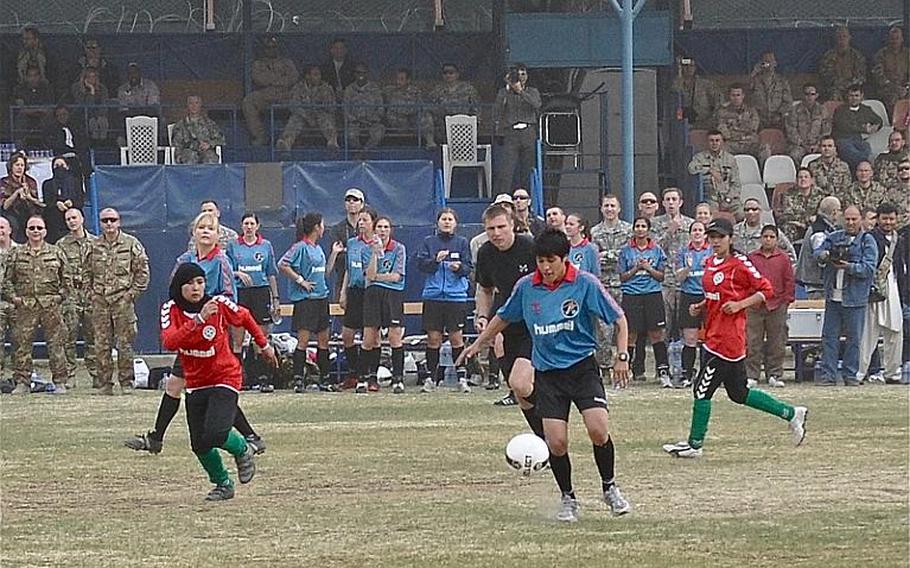
ISAF women's soccer team captain Danielle Figueroa controls the ball during a friendly match against the Afghan national women's soccer team at ISAF Headquarters in Kabul on Friday. (Dianna Cahn/Stars and Stripes)
KABUL, Afghanistan — It’s not often you see U.S. troops rooting for the other team.
But on Friday at ISAF Headquarters in Kabul, the main NATO base and nerve center for this nine-year war, some soldiers were doing just that.
On a damp, foggy day, soldiers blatantly cheered on the Afghan soccer team playing against their own multinational NATO troops.
The reason was simple: The players were women. And seeing women playing soccer in Afghanistan was something for everyone there to cheer about.
“Just a few years ago, this would not have been possible; the Taliban would not have allowed it,” said U.S. Air Force Brig. Gen. Jerry Martinez, who insisted on carving time out to see the game despite pressing work trying to iron out a crisis with the Afghan government over security contractors that President Hamid Karzai is trying to ban.
“Did you see the Afghans running with their flag? They truly have a national pride that the people who are conducting this insurgency can’t take away from them. The pride these women are showing today is not going to be taken away.”
The Afghan women’s soccer team has been playing for five years. Under the Taliban, women were brutally oppressed and severely punished for showing too much skin, or venturing out of their homes alone.
The symbolism of the match was not lost on the young Afghan women who took the field Friday. Some chose to cover their hair, others just pulled their locks into a ponytail, like the Western women.
Playing the sport at all is risky in a culture so conservative that many women still wear a full body covering, or burqa. Playing it at the NATO military base could easily make them targets.
“I accept this risk to come here on a military base, but because I love football, I came here,” said Afghan team captain Zahara Mahmoodi, 20, who was born in Iran to Afghan parents who fled during the Russian occupation in the 1980s and returned when the Taliban were ousted. “This game shows that the Afghan people, especially girls, want peace.”
Engaging these Afghan women in a game of soccer also intrigued the Americans who organized the match.
“Ten years ago, they were assassinating women in soccer arenas,” said Senior Airman Omar Medina.
Medina began organizing the game just six weeks ago, after receiving a call from the Afghan women’s coach. ISAF didn’t have a team, so Medina got the word out and organizers began cobbling one together.
Nearly half the ISAF team had never played soccer, said the team captain, Marine Corps Sgt. Danielle Figueroa, 37, who divides her time equally between homes in Tampa, Fla., and Thousand Oaks, Calif.
But Figueroa, who played soccer in college and was a member of an all-star team that did outreach work in poorer countries, didn’t care about all that. She just wanted to make sure that she gave the Afghans a respectable match.
In fact, the match was organized in such a friendly fashion that the two teams met a week ago to play a practice game and get to know one another.
“It wasn’t until last week that I realized I’ve taken for granted the freedoms I have to play sports,” Figueroa said.
The score was not important to Khalida Popal, either. The 23-year-old is one of the Afghan team’s stars, and her passion for soccer, or football, is boundless.
For Popal, the match with NATO women was about something bigger.
“We wanted to show them that we are friendly,” Popal said. “We have some stupid people that are fighting. By doing this game, we show them we have good people, also. The aim is to show we want peace.”
The Afghan team came out in crisp, new red uniforms donated by the Danish sporting goods maker Hummel, which has adopted the team and has committed to supporting it for five years.
“Women have been told for many years they are unable to practice their passions,” said Christian Stadil, owner of the Thornico Group, which owns Hummel among other companies. He arrived from Denmark the morning of the match.
“Just look at these fantastic girls with fire in their eyes,” he said. “It’s all about the sport’s ability to tear down barriers of politics, religion and national culture.”
The Afghan team came away with a 1-0 win. But both sides, and everybody in the stands, cheered for the game and for the Afghan flag that a young man let fly as he did a lap around the field.
And the Afghan women drove home that, although they came wanting to win, just playing was what mattered most.
“(People) told me fooball was not for girls, you have to stop playing,” Popal said. “They think that bad girls are playing football and no one will marry a girl who plays.”
But her love of the sport drove her on Friday.
“This is my message for any woman who loves football or any sport,” Popal said. “They have to fight and be able to play.”